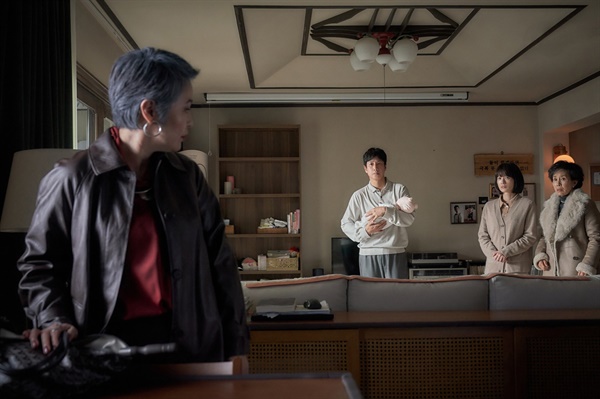
Korean horror films have long been a masterclass in blending psychological unease with deeply ingrained cultural fears. Sleep (잠), starring the late Lee Sun-kyun and Jung Yu-mi, is no exception. This slow-burn horror-thriller, directed by Jason Yu, navigates the unsettling intersection of science and superstition, leaving audiences questioning reality and their own fears.
Summary of the Story

The film follows newlyweds Hyun-su (Lee Sun-kyun) and Soo-jin (Jung Yu-mi) as they struggle with Hyun-su’s disturbing nighttime behavior. At first, his sleepwalking episodes seem harmless—muttering strange things, wandering the house—but soon escalate into something more sinister. Soo-jin, exhausted and terrified, starts to suspect that her husband might be possessed by an otherworldly force.

As Hyun-su’s condition worsens, the couple seeks medical advice, leading to a debate between scientific explanations—sleep disorders, stress—and traditional beliefs involving shamanism and malevolent spirits. When medical treatments fail, Soo-jin turns to a shaman for answers, setting the stage for eerie rituals, ominous warnings, and an escalating sense of dread.
Science vs. Superstition: The Core Theme of Sleep

The film expertly weaves together Korea’s deep-rooted shamanistic beliefs with modern scientific skepticism. Sleep paralysis, sleepwalking, and night terrors are all well-documented conditions, yet in Korean folklore, these disturbances have long been linked to ghostly encounters or spiritual possession.
Hyun-su’s condition is analyzed from both perspectives—doctors see a neurological disorder, while the shaman warns of an evil presence. Soo-jin’s growing desperation blurs the line between reason and superstition, making the audience question whether the horror is supernatural or psychological. This tension between science and mysticism is a recurring theme in Korean horror, reminiscent of The Wailing (곡성) and Exorcism of the Devil (사바하).
Is Sleep Actually Scary?

While Sleep isn’t packed with relentless jump scares, it builds an atmosphere of creeping dread. The film leans more into psychological horror, using eerie silences, unsettling rituals, and an oppressive sense of paranoia. There are a few well-timed jump scares, but what lingers is the tension—the fear of losing control over one’s own body, of waking up to an unrecognizable loved one.
The incorporation of Korean shamanistic rituals, such as spirit offerings and ceremonial chants, adds an extra layer of unease, especially for viewers unfamiliar with these practices. The film’s horror lies in its ambiguity—whether Hyun-su is truly possessed or simply suffering from an undiagnosed disorder remains open-ended, leaving the audience haunted long after the credits roll.
[SPOILER ALERT] Different Interpretations of Sleep’s Ending
![FILM REVIEW] SLEEP (2023) - The Seoul Story](https://theseoulstory.com/wp-content/uploads/2023/09/1st-Press-Stills-3-1024x683.jpg)
The conclusion of Sleep is deliberately ambiguous, leaving viewers with multiple possible interpretations:
-
Supernatural Explanation: Some believe that Hyun-su was indeed possessed by a malevolent spirit all along, and the rituals performed by the shaman either temporarily suppressed or failed to completely remove the entity. This would explain his progressively violent episodes and Soo-jin’s growing paranoia.
-
Psychological Breakdown: Others interpret the ending as a commentary on mental illness. Soo-jin, driven by stress and fear, may have projected supernatural explanations onto Hyun-su’s sleep disorder, ultimately exacerbating his condition and her own psychological decline.
-
Metaphor for Marital Struggles: Some viewers see Sleep as an allegory for the breakdown of trust and intimacy in a marriage. Hyun-su’s nighttime behaviors symbolize hidden fears and secrets that gradually corrode their relationship, leaving Soo-jin desperate for control and stability.
The film’s open-ended nature allows for multiple readings, making it a thought-provoking experience that lingers in the mind long after watching.
Awards and Recognition

Sleep premiered at the Cannes Film Festival 2023 in the Critics’ Week section, receiving critical acclaim for its suspenseful storytelling and Lee Sun-kyun’s gripping performance. The film was later nominated for several awards, including Best Director and Best Actor at various Korean film festivals.
The Tragic Passing of Lee Sun-kyun

The film holds an even heavier emotional weight following the untimely death of Lee Sun-kyun in December 2023. The beloved actor, known internationally for his role in Parasite, was one of Korea’s most respected performers. His nuanced portrayal of Hyun-su in Sleep is a testament to his incredible talent, making the film an essential watch for those who appreciate his work.
Final Thoughts
Sleep is a chilling exploration of the human psyche, fear, and the cultural battle between logic and belief. It is made even more poignant by Lee Sun-kyun’s final, haunting performance. For fans of slow-burn horror, psychological thrillers, and Korean folklore, Sleep is a must-watch. And if you’re feeling uneasy afterward, perhaps a Korean talisman or two from BIROSO might help keep the nightmares at bay.
